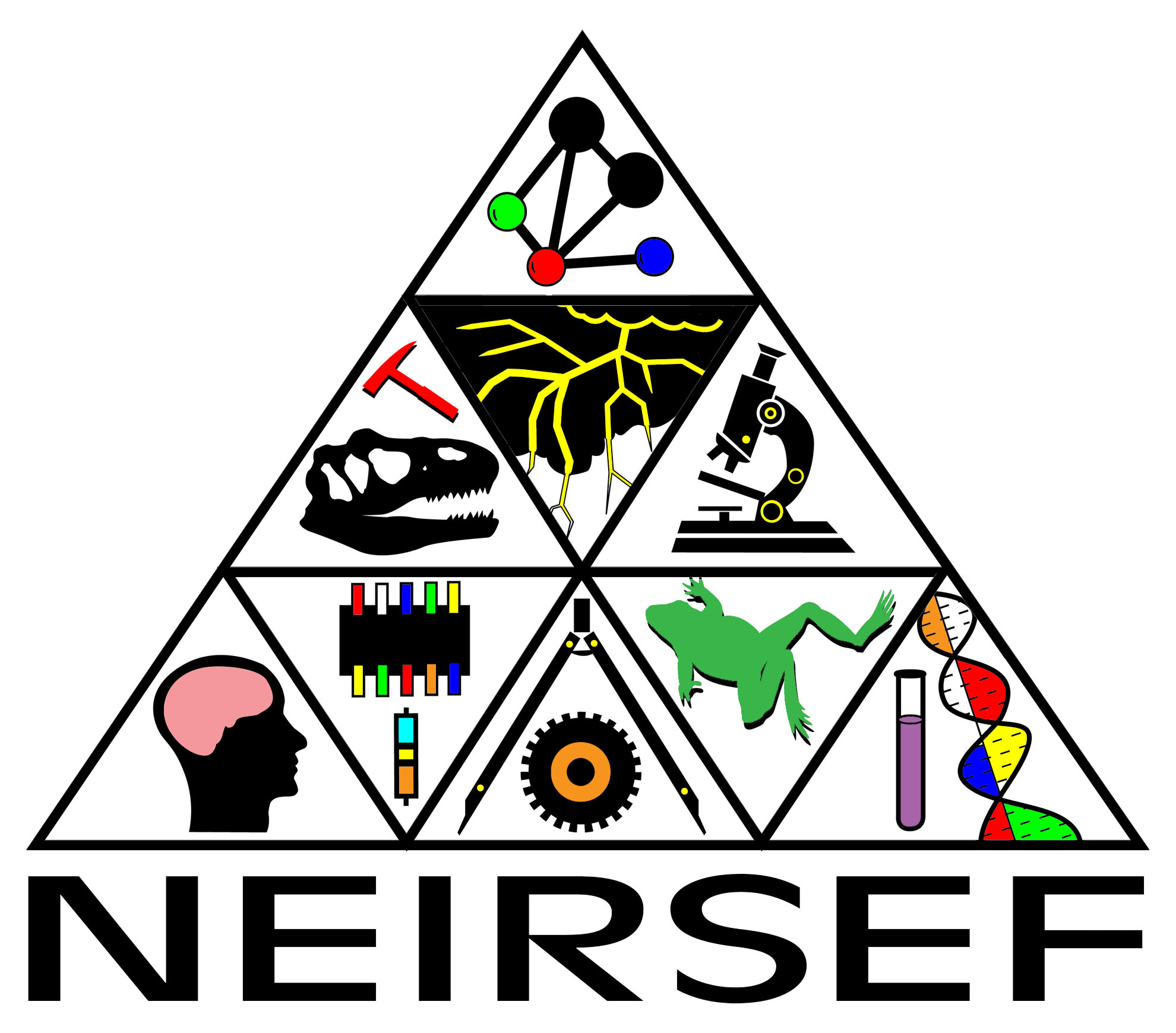For Junior Division (Grades 6-8)
Categories | Safety | Prohibited | Informed Consent | Registration | Display Rules | Additional Resources
Overview
Research projects in grades 6-8 are eligible to advance from the school level to NEIRSEF. Projects may be submitted by an individual or a team of up to three people. All Junior Division researchers are eligible for local and special awards. Up to eight projects will be advanced to the Hoosier Science and Engineering Fair (HSEF).
Every Junior Division student should have the following items as part of their science fair project display:
- Exhibit Board
- Logbook
- Research paper
- Abstract
See p. 3 of the Rules for Indiana Elementary and Middle School Research (Jr Rules, 2024) for more details. Projects with all four elements are more likely to receive awards and advancement to HSEF than those that do not.
Categories
Decide what type of project you are doing. Click this link to see the types of projects you can enter in NEIRSEF. Projects in grades 6-8 are judged by Category, so choose the best category to describe your research.
Safety
It is important that your pursuit of science be safe for all involved. For this reason, there are guidelines for students to follow at each level.
Students in grades 6-8 do NOT submit ISEF paperwork, unless you are conducting research that involves human subjects (see Informed Consent). The expectation is that your teachers will provide you the rules for a safe and acceptable research project. Middle schools teachers and fair coordinators are responsible for making sure you follow the rules. They will use the Rules for Indiana Elementary and Middle School Science Research to do this. See p. 4 of the document for more on prohibited and restricted research.
Bacteria and Fungi Studies
Students in grades 6-8 may conduct bacteria or fungi studies ONLY if your teacher has been trained and certified for BSL-1 work AND the research is conducted in a BSL-1 or higher laboratory, either at the school or in a professional setting. No research in this category may be conducted at home - no exceptions! Contact the Fair director (scifair@pfw.edu or (260) 481-6516) to discuss your research design. (Rules, 2024, p. 9).
Animal Behavior Studies
All animal behavior studies should be reviewed in advance and monitored by a Veterinarian to ensure your safety and the animal's safety. If you have trouble identifying a veterinarian, contact the fair director. The Northeast Indiana Veterinary Association is a long time NEIRSEF sponsor and will help us to identify someone to work with you.
Prohibited - No exceptions
(Jr. Rules, 2024, p. 4)
- Animal tissue, including human
- Radioactive substances
- Hazardous chemicals or reagents
- Biological agent experiments conducted at home
- Vertebrate animal research involving pain or withholding of food or water
- Class IV lasers
Informed Consent
All projects involving Human subjects must complete two ISEF forms (Form 4 and the Human Informed Consent Form) and must submit to review before experimentation begins. This must be done through a properly established Institutional Review Board (IRB) at the school level. If your school has questions about this new policy, please ask them to contact the Fair director.
Informed consent forms must include:
- Purpose of the project
- What the person in the study (the "subject") will be asked to do
- An adult's name and phone or email (usually a teacher) who a parent can contact with further questions
- A place for the subject to sign and date
- A place for the subject's parent or guardian to sign (if the subject is under 18)
Registration
(Jr. Rules, 2024, pp. 9-10, 15-18)
All student research projects at NEIRSEF must be advanced by their school or homeschool group. A teacher, principal, or designee must first register as a teacher at the SEFI web site and create a student account for you. NOTE: Only students advanced to the Regional Fair will be entered at the SEFI web site. Your school can only advance a limited number of projects, so this will occur after your school-level fair. If your school does not host a fair, you will still need a teacher or designee to advance you to the Fair.
Once your student account is generated, they will be give you a username and password so you can login and add the following details. Your teacher or parent may help you. This information is kept private and used to determine eligibility and to communicate with you before and after the Regional Fair.
- Date of Birth
- Gender (optional)
- Ethnicity (optional)
- Email address (not a school email, please!)
- Address
- Phone number
- Grade
- Project Name (title of your project)
- Project Category
You will also be asked to enter a Research Plan and an Abstract.
The Research Plan includes:
- Research question
- Hypothesis (science) or Engineering Goal
- Experimental Design (your step-by-step procedure/experimental method)
- Bibliography / References (what books and/or web sites did you read to help you design/understand your research project?)
ISEF has produced a series of research plan templates you might find useful as you construct your research design. Download the templates for Standard Research, Engineering Research, Engineering Research with humans, Research with human subjects, Research with potentially hazardous biological agents, or Research with vertebrate animals from this page of the ISEF web site.
The Abstract is a brief written explanation of your research project. It helps judges discern quickly whether your project qualifies for specific awards. It is written in narrative form (paragraph, not bullet points) and composed of four parts:
- The purpose and hypothesis(science) or goal(engineering) of the research project
- The research methods or procedures
- The data collected and your methods of data analysis
- The conclusions or results
You may decide to download the following graphic organizer to assist you in writing your abstract.
Rather than typing the research plan into the web site, you may choose to download, print, and fill in the Indiana Junior Division Form(also, Jr Rules, 2024, pp. 15-16). You will need to scan and upload this to the site before the competition.
All projects competing at NEIRSEF will be reviewed by the SRC/IRB prior to the competition. Your project cannot be reviewed if you have not completed this paperwork. Project review begins after student registration ends on the Friday two weeks before the fair. In 2025, this date is Friday, February 14, 2025 at 5:00 pm.
Display Rules
(Jr. Rules, 2024, pp. 6-8)
The NEIRSEF display rules must be followed by all exhibitors at the regional fair, regardless of the rules used at the student's local fair. Fair personnel will inspect all exhibits for compliance with these rules and any non-conforming items must be removed from the display. For a full description of official display rules, review the ISEF Display and Safety Regulations.
Additional Resources
There are several resources available to help guide you as you prepare your research project. NEIRSEF will be adding some support videos soon. Remember, your goal is to do something as original as possible, so use any kits or experiment ideas as a starting point and list them in your references. The fair director highly recommends the book "STEM Student Research Handbook" by Darci J. Harland to guide you through the Fair (available at Amazon in print and Kindle editions). Here are a few web sites you might also consider:
- Science Buddies science fair project guide
- Super Science Fair Projects site selling project kits, student guides, and teacher guides



